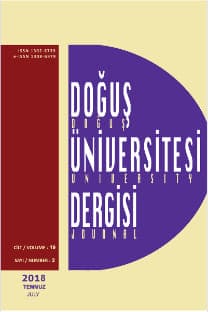Bu çalışmanın amacı "Öğrenci-merkezli" bir yabancı dil eğitim programının, öğrencilerin okuma ve yazma gibi temel birtakım dil becerilerinin gelişmesine yardımcı olmasının yanısıra, öğrenme sorumluluğu alma ve bağımsız çalışma yetilerinin arttırılması üzerinde de olumlu etkileri olabileceğine dikkat çekmektir. Bu fikir Doğuş Üniversitesi’nde birinci sınıf öğrencilerine verilen İngilizce -2 dersi örneği üzerinde anlatılmaktadır. Bu derste öğrencilere akademik standartlara uygun bir proje çalışmasını tamamlayabilmek için seçtikleri konu üzerinde araştırma yapmak, bilgi toplamak, not tutmak, özetlemek ve analiz edilen bilgilerden bir sentez oluşturmak gibi bir takım öğrenme deneyimleri kazandırılması amaçlanmaktadır. Çalışmanın oldukça önemli bir kısmı ders dışı zamanlarda, öğrencinin kendisi tarafından yürütülmektedir. Bu dersi alan birinci sınıf öğrencilerinin İngilizce ve akademik standartlara uygun araştırma yapma becerilerinin yanısıra, üniversite öğrencisi olmanın temel özelliklerinden olan öğrenme sorumluluğunu alma ve bağımsız çalışma yetilerini de geliştirdiği fikri benimsenmiştir.
Anahtar Kelimeler:
Öğrenci-Merkezlilik, Bağımsız Çalışma, Bireysel Öğrenme, Öğrenme Sorumluluğu Alma.
THE ROLE OF A LEARNER-CENTRED APPROACH IN LANGUAGE TEACHING ON THE DEVELOPMENT OF LEARNER AUTONOMY : A MODEL COURSE DESIGN
This paper aims at assessing the role of a "Learner-centred" approach in language teaching on the development of learner autonomy. It is argued in this paper that a foreign language course designed with a learner-centred focus not only helps learners increase their competence in the use of the language but also allows them to develop some strategies on "learning how to learn". This, in effect, promotes the development of learner autonomy and encourages students to take responsibility for their own learning and to become independent learners, the two important requirements of university education. This is illustrated through the design of a model course, namely English -2, offered to freshman year students at Doğuş University. This course takes students through the stages of conducting academic research and presenting the findings of their research in the form of a written project which appropriately fulfills academic standards. The design of the course requires much of the work to be done outside class and by the learners themselves. Hence, this paper develops the idea that students who take this course increase their confidence in working on their own as well as learning to take the responsibility for their own learning, which are the two major demands of academic study in university education.
Keywords:
Learner-Centredness, Independent Study, Learner Autonomy, Taking Responsibility for Learning.,
___
- DICKINSON, L. (1987). Self-instruction in Language Learning. Cambridge: Cambridge University Press.
- NUNAN, D. (1989). Designing Tasks fo r the Communicative Classroom. Cambridge: Cambridge University Press.
- NUNAN, D. and C. Lamb. (1996). The Self-Directed Teacher. Cambridge: Cambridge University Press.
- RICHARDS, J. C. and T.S. Rodgers. (1986). Approaches and Methods in Language Teaching. Cambridge: Cambridge University Press.
- TUDOR, I. (1996). Learner-centredness as Language Education . Cambridge: Cambridge University Press.
- ISSN: 1302-6739
- Yayın Aralığı: Yılda 2 Sayı
- Başlangıç: 2000
- Yayıncı: Doğuş Üniversitesi
